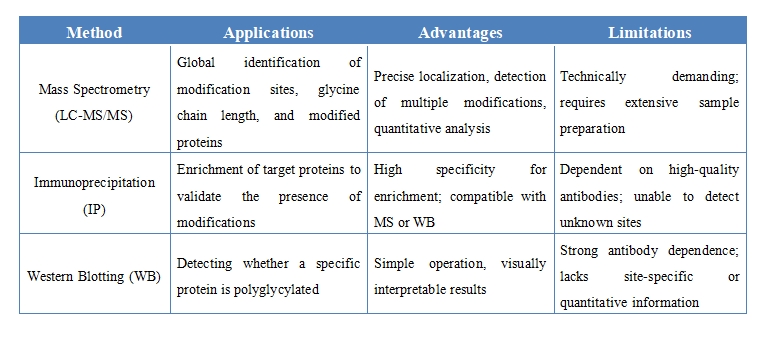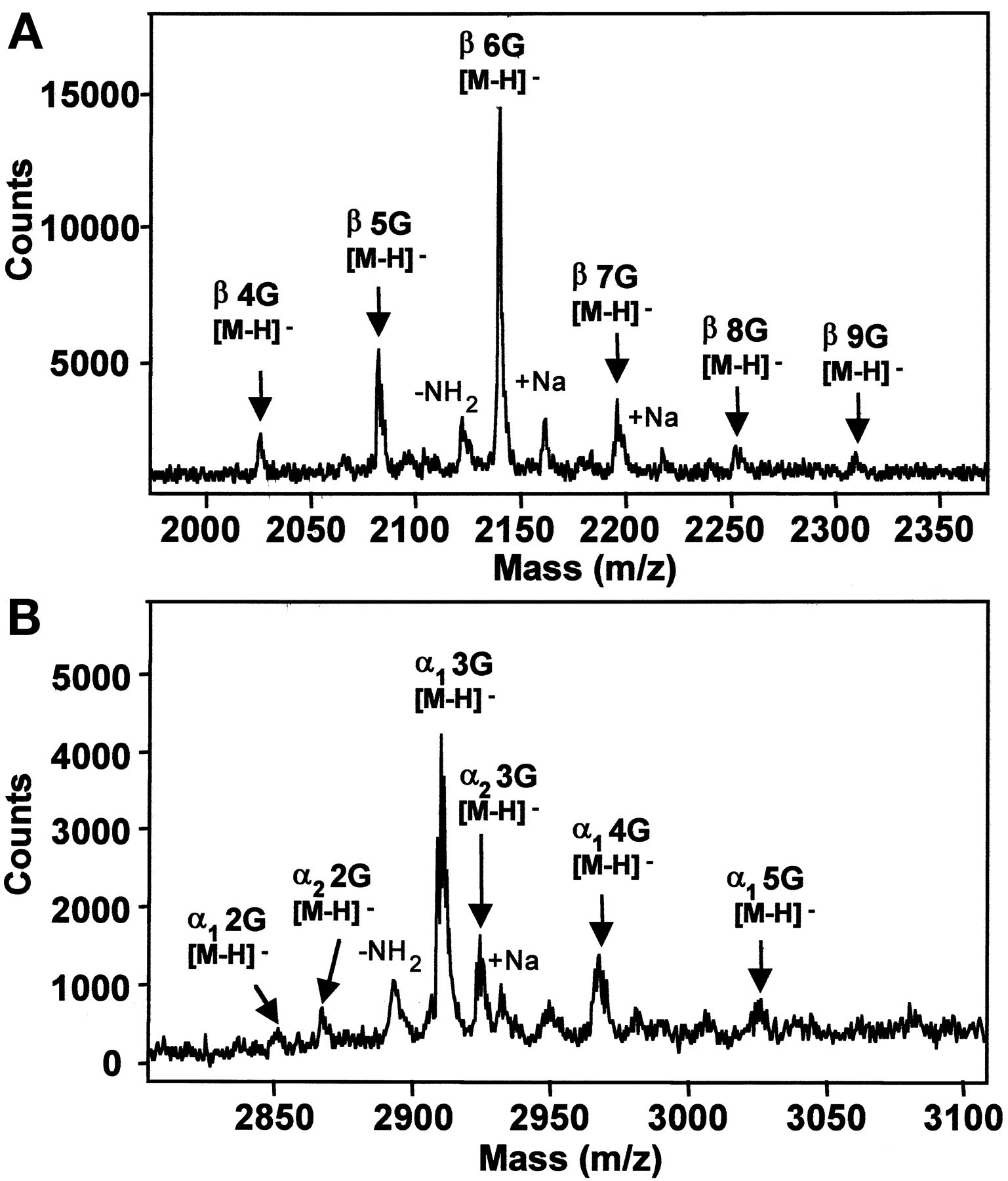Polyglycylation Proteomics Service
Polyglycylation proteomics analysis is a high-resolution proteomics approach focused on the identification and characterization of protein polyglycylation modifications. By integrating high-resolution mass spectrometry platforms with specific enrichment strategies for modified peptides, it enables highly sensitive detection of polyglycylation sites and modification levels. This approach is designed to help researchers gain a deeper understanding of the regulatory roles of this modification in cellular structure and function. Polyglycylation is a unique post-translational modification in which multiple glycine residues are covalently linked via amide bonds to the γ-carboxyl group of glutamate residues, primarily occurring in tubulin. This modification influences microtubule stability, dynamics, and interactions with associated proteins, and holds significant biological importance.
Polyglycylation proteomics service is widely applied in studies of microtubule regulatory mechanisms, analyses of neural development and synaptic plasticity, investigations of ciliary or flagellar dysfunction-related diseases, as well as mechanistic exploration of microtubule-related pathologies such as neurodegenerative diseases and inherited ciliopathies. It can also be used to identify potential drug targets associated with microtubule modifications.
Services at MtoZ Biolabs
Based on advanced analysis and detection platform, combined with optimized sample preparation workflows and specific peptide enrichment strategies, the polyglycylation proteomics service offered by MtoZ Biolabs is dedicated to the detection and analysis of protein polyglycylation modifications. This service enables systematic analysis of microtubule proteins in complex samples such as cells and tissues, accurately identifying modification sites and their corresponding peptide sequences. It provides high-confidence information on modification sites, peptide sequences, and modification spectra, supporting comprehensive characterization and functional studies of microtubule-associated proteins. Common analytical methods employed in this service include the following:

Analysis Workflow
1. Protein Extraction and Digestion
Proteins are extracted from cells or tissues and subjected to reduction, alkylation, and enzymatic digestion, with the preservation of polyglycylation modifications to ensure the integrity of downstream detection.
2. Enrichment of Modified Peptides
Specific chemical labeling or antibody-based enrichment strategies are employed to selectively capture polyglycylated peptides, improving the detection efficiency of low-abundance modified peptides.
3. Analytical Detection
A combination of mass spectrometry, immunoprecipitation, and Western blotting techniques is used to accurately detect peptide sequences and polyglycylation modification sites, confirming the presence of the modification.
4. Data Interpretation and Result Output
Modification sites, peptide sequences, spectral data, and functional annotations are provided through database searching and algorithmic analysis, supporting subsequent biological research.
Sample Submission Suggestions
1. Sample Types
A wide range of sample types is supported, including cells, tissues, body fluids, and purified proteins. Samples with high expression levels of microtubule proteins are recommended to enhance detection efficiency.
2. Buffer Compatibility
Avoid buffers containing high concentrations of salts, SDS, glycerol, or other components that may interfere with mass spectrometry. Buffer optimization guidance can be provided upon request.
3. Sample Transport
Samples should be stored at –80°C and shipped on dry ice to maintain the stability of protein modifications and prevent degradation or loss of polyglycylation signals.
Service Advantages
1. High-Resolution Platform Support
Utilizes advanced mass spectrometry platforms such as Orbitrap to enable highly sensitive and accurate detection and quantitative analysis of polyglycylation modifications.
2. Targeted Enrichment Strategy
Employs optimized enrichment methods specific to polyglycylated peptides, significantly improving the detection efficiency and specificity for low-abundance modifications.
3. Precise Modification Site Characterization
Accurately identifies modified glutamate residues and glycine chain lengths, delivering high-confidence peptide sequences and spectral data.
4. Comprehensive Technical Support
Covers the entire workflow from sample preparation and enrichment to mass spectrometry analysis and bioinformatics interpretation, supporting mechanistic and functional studies of the modification.
Applications
1. Microtubule Structure and Functional Analysis
Polyglycylation proteomics service is widely used to investigate how polyglycylation regulates microtubule protein stability, assembly dynamics, and interactions with associated proteins, revealing its essential role in cytoskeletal organization.
2. Cell Migration and Tissue Remodeling Studies
This service supports the analysis of polyglycylation in regulating cell morphology, polarity establishment, and migration behavior, particularly in contexts such as embryonic development, tissue regeneration, and cancer metastasis.
3. Epigenetic and Modification Network Interaction Research
Polyglycylation analysis can be integrated with studies of other tubulin-related modifications (e.g., polyglutamylation, deacetylation) to explore synergistic regulatory networks and their impact on cellular function.
4. Neural Development and Functional Regulation
Polyglycylation proteomics service is applied to study its roles in neuronal differentiation, axon guidance, and synaptic plasticity, contributing to the understanding of the molecular basis of neurological diseases.
Case Study
1. Tubulin Polyglycylation: Differential Posttranslational Modification of Dynamic Cytoplasmic and Stable Axonemal Microtubules in Paramecium
This study aimed to analyze the differential polyglycylation patterns of tubulin in various types of microtubules in Paramecium and to evaluate the effectiveness of polyglycylation proteomics in detecting such modifications. The study focused on cytoplasmic and axonemal microtubules and employed specific antibodies, immunoblotting, immunofluorescence, and mass spectrometry to compare the distribution and glycine chain length of the modifications. The results showed that axonemal microtubules exhibited significantly higher levels of polyglycylation and longer glycine chains than cytoplasmic microtubules, suggesting a strong association between this modification and microtubule stability. The study concluded that polyglycylation displays region- and structure-specific distribution in Paramecium, and that mass spectrometry offers a highly sensitive approach to distinguish modification patterns between microtubule subtypes, providing a valuable tool for understanding microtubule functional specialization and regulatory mechanisms.

Bré, M H. et al. Molecular Biology of the Cell, 2017.
Figure 1. MALDI-TOF Mass Spectrometry of the Main Reverse Phase HPLC Fraction of Cytoplasmic Tubulin Carboxy-Terminal Peptide.
FAQ
Q1: What Types of Modifications Can the Polyglycylation Proteomics Service Detect?
A1: This service focuses on identifying polyglycylation modifications on glutamate residues of proteins. It enables precise localization of modification sites, determination of glycine chain lengths, and provides peptide sequences and modification spectra based on mass spectrometry data.
Q2: Can the Service Detect Low-Abundance Modifications?
A2: Yes. By employing an optimized enrichment strategy for polyglycylated peptides and utilizing the highly sensitive Orbitrap mass spectrometry platform, the service can accurately detect polyglycylation even in complex samples and at low abundance levels.
How to order?







